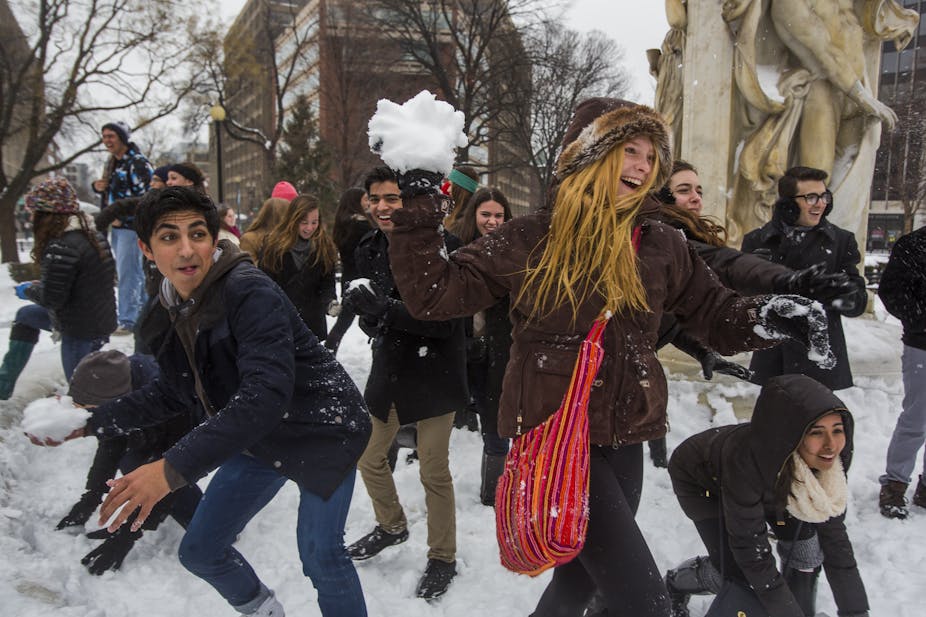Students who are held back a year in school or who are older than average for their grade have long been known to be more likely to misbehave and to be suspended from school. But what’s not been clear until now is whether their presence causes ill-discipline across the school community.
In the US, accountability policies in schools have increased the number of students who are old for their grade, or have had to repeat a school year. Schools are evaluated on the basis of students’ demonstrated proficiency in certain skills, such as maths and literacy, for each grade. These policies have led to less frequent “social promotion” – where children automatically progress to the next grade regardless of their ability. Instead, there has been an increase in the proportions of children retained in grade after they fail standardised academic performance tests.
Additionally, some parents choose to hold back their children from entering kindergarten when they become eligible at age five. This trend, known as the “greying of kindergarten”, is linked to concerns about state and school accountability. There are also perceptions among parents that students who are older than their classmates have an advantage in school.
Debates on the consequences of these policies draw upon studies highlighting the effects of grade retention and older age on school attainment and behaviour of these students. But little attention has been paid to the implication on students who themselves are not at academic risk, but who must share classrooms with older and retained students.
Following the leader
Social science theories of peer influence frame questions of how older and retained peers may affect student behaviour in school. These children are more likely to get into trouble at school, in part because of the strong relationship between academic performance and behaviour.
Older students are more inclined to engage in behaviours that seem more “adult” or fitting with their physical appearance, despite a lack of social skills needed for making decisions regarding appropriate behaviour.

A stronger presence of peers who are more likely to misbehave can influence other students through the daily school climate, as well as through increased opportunities for directly interacting with at-risk students. Middle school students are particularly vulnerable to such peer influences, since early adolescence involves developmental adjustments that result in changing relationships with peers, family, and authority figures.
In a recent study, we looked at 79,314 seventh-graders in 334 North Carolina middle schools, using administrative data provided by the public schools and archived by the North Carolina Education Research Data Center at Duke University.
We compared data across schools and took into account student, school, and district-level factors that influence school behaviour. What we found was that the likelihood of a student committing an infraction, the number of infractions per student, and the likelihood of a student being suspended were all significantly higher among students attending schools with higher proportions of retained and older students.
Lowering the tone
There was increased negative behaviour across all groups of students who have higher levels of peers who have been held back a year. But this effect was stronger for students who were themselves retained. Older students share a similar vulnerability to the influence of their peers. There were stronger effects on ill-discipline on older students in classes with more older peers.
Unexpectedly, we found that students in groups that were least likely to engage in misbehaviour were the most susceptible to the potential negative peer influence of retained and older peers. This suggests that contact with older and retained peers can contribute to delinquent behaviour even if the direct contact is not very close or frequent.
These findings can help feed into longstanding debates regarding the benefits and drawbacks of grade retention and delayed school entry. They shift the focus away from the older and retained students themselves, to consider the implications for the entire school community.
For some individual students, being held back a year or delaying school entry might be the appropriate choice for their ultimate success in school. However, it is important that educators and politicians acknowledge that policies that make students repeat a year, and those that delay children starting schools, can have significant school-wide consequences.
Given consistent research evidence of the strong relationship between academic success and behaviour in school, policies that support students academically and prevent them falling back a year have the potential to benefit students who are at risk of academic failure, and can enhance positive behaviour across the entire school community.

